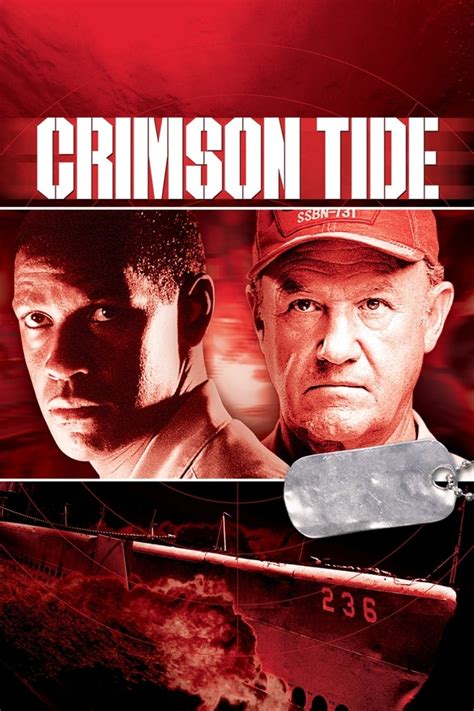Crimson Tide

Description:
In the midst of a crisis, the captain and executive officer of a nuclear submarine must put aside their differences and work together to prevent a potential nuclear disaster. Tensions rise as conflicting orders and personal beliefs test the crew's loyalty and resolve.Keywords:
Mutiny, Nuclear Tension, Chain Of Command, Moral Dilemma, Submarine WarfareWhy does Alabama say Crimson Tide?
In the movie "Crimson Tide," the term "Crimson Tide" refers to the nickname of the University of Alabama's athletic teams, particularly its football team. The title symbolizes the pride and tenacity of the characters, particularly those in the U.S. Navy submarine USS Alabama. The phrase is emblematic of the struggle and conflict faced by the crew, especially during the moral dilemmas and command disputes depicted in the film. The name serves as a metaphor for the intense battles and loyalty among the crew members.
Is Crimson Tide a true story?
"Crimson Tide" is not based on a true story, but it draws inspiration from real-life naval situations and the complexities of military command. The film, released in 1995 and directed by Tony Scott, explores a tense standoff aboard a U.S. Navy submarine during a potential nuclear crisis. While the characters and specific events are fictional, the themes of loyalty, authority, and the moral dilemmas faced by military personnel reflect real challenges in naval operations.
What is the meaning of the Crimson Tide?
In the movie "Crimson Tide," the term "crimson tide" refers to a naval alert status indicating a potential nuclear conflict. It symbolizes the tension and moral dilemmas faced by the crew of a U.S. submarine during a standoff between the United States and a rogue Russian faction. The title also evokes themes of loyalty, command, and the weight of decision-making in life-and-death situations. Additionally, "crimson" can represent bloodshed and the harsh realities of warfare, highlighting the film's exploration of responsibility and the consequences of action.
What did Quentin Tarantino do in Crimson Tide?
In "Crimson Tide," Quentin Tarantino contributed as a screenwriter. He wrote an early draft of the script, which was ultimately revised by the film's director, Tony Scott, and co-writer, Michael Schiffer. Tarantino's signature style and dialogue influenced the film's tension and character dynamics, although his specific contributions were modified in the final version. "Crimson Tide," released in 1995, is a submarine thriller that explores themes of authority, loyalty, and moral dilemmas amid a nuclear crisis.
Explore More Categories: